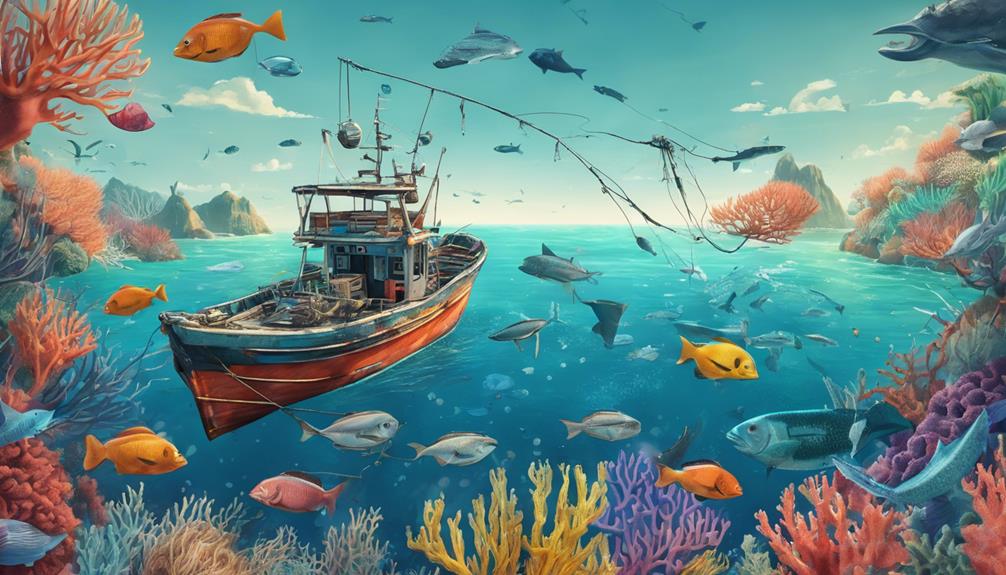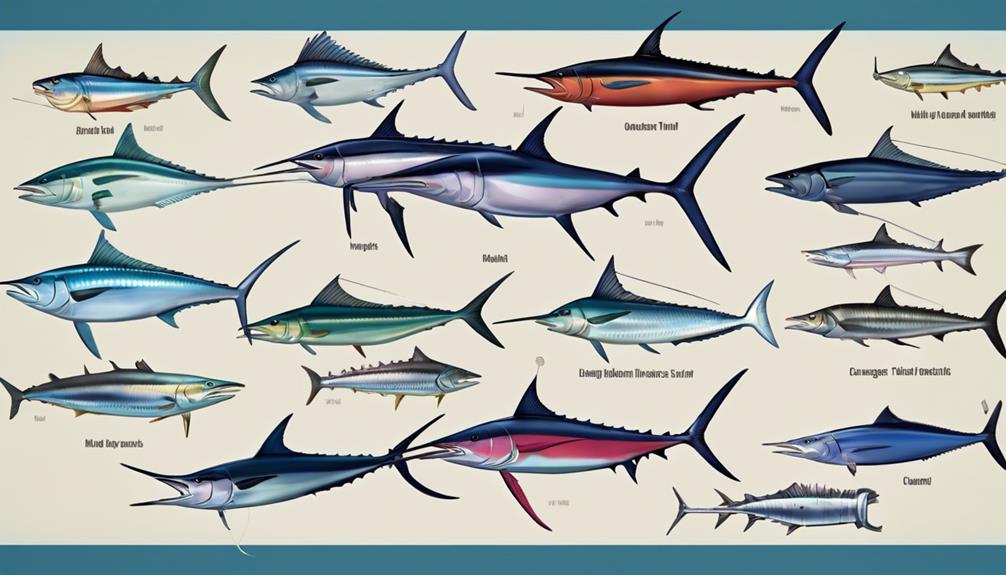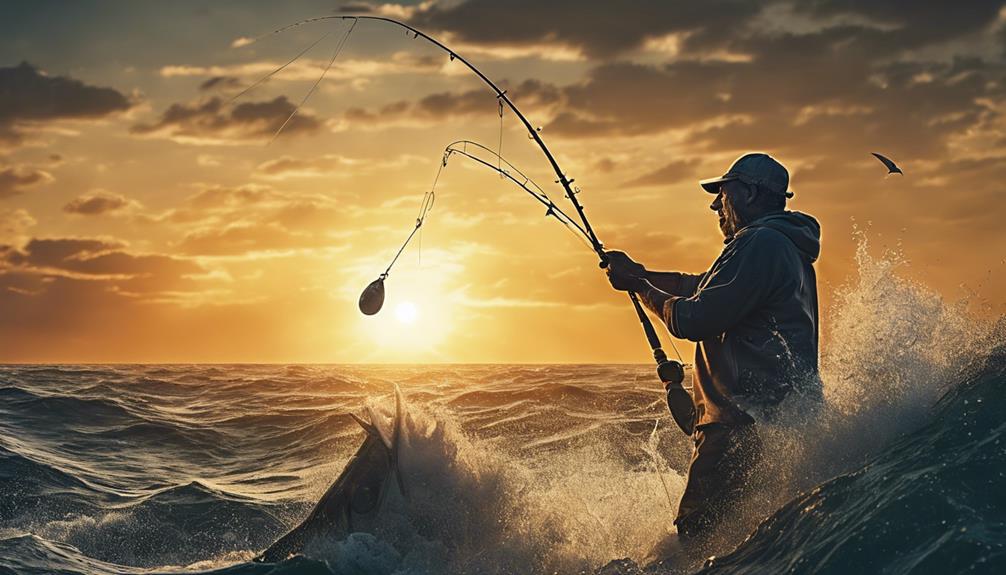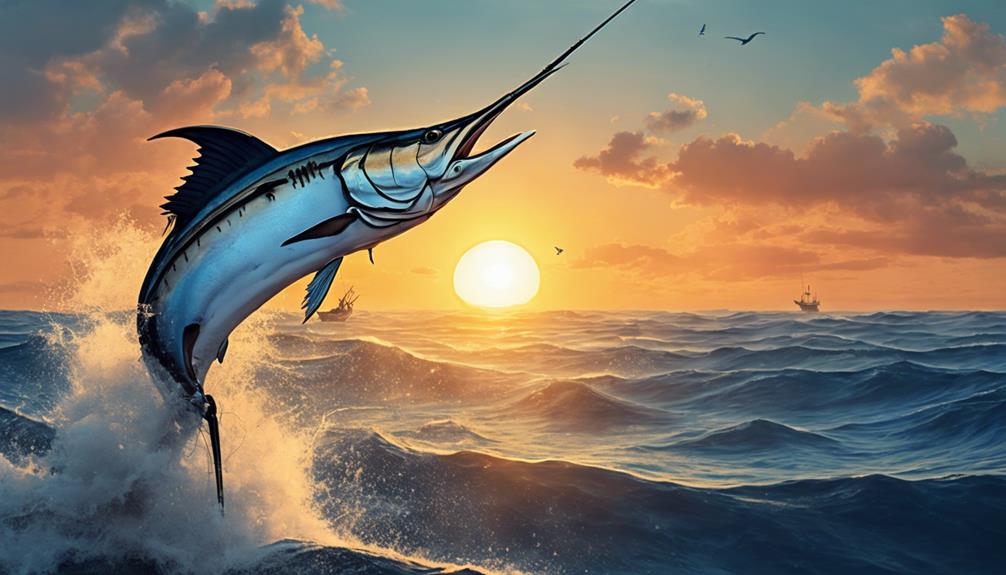Imagine the vast expanse of the deep sea, teeming with life and mystery. As a deep-sea fishing enthusiast, you hold the power to make a positive impact on this fragile ecosystem. By implementing simple yet effective tips, you can help preserve marine biodiversity and ensure a sustainable future for generations to come.
From choosing the right fishing gear to supporting conservation efforts, each action you take plays a crucial role in safeguarding our oceans. Let's explore how these 10 tips can help you become a responsible deep-sea angler.
Understanding Deep Sea Ecosystem
To truly grasp the impact of deep sea fishing on the environment, it's crucial to understand the intricate workings of the deep sea ecosystem. Deep sea biodiversity refers to the variety and variability of life forms in the deep ocean. This ecosystem is a complex web of interactions between different species and their physical environment, with each organism playing a vital role in maintaining the overall balance.
Ecosystem dynamics in the deep sea are fascinating and delicate. The deep sea is home to a wide array of species, from bioluminescent fish to giant squid, each adapted to survive in the extreme conditions of the deep ocean. These organisms have evolved unique characteristics and behaviors over time, shaping the dynamics of the ecosystem. For example, some species rely on hydrothermal vents for energy, while others scavenge on the ocean floor for food.
The deep sea ecosystem is interconnected, with each species depending on others for survival. Disrupting this delicate balance through activities like deep sea fishing can have far-reaching consequences. Overfishing can lead to a decrease in certain species, causing a ripple effect throughout the food chain. This disruption can result in the loss of biodiversity and impact the overall health of the deep sea ecosystem. Understanding these complex ecosystem dynamics is crucial in mitigating the environmental impact of deep sea fishing.
Sustainable Fishing Practices
Understanding the importance of sustainable fishing practices is essential in preserving the delicate balance of the deep sea ecosystem. By adopting sustainable fishing practices, you contribute to the conservation of fish populations and the preservation of their habitats.
Overfishing can deplete fish populations, disrupting the ecosystem's natural balance. Sustainable fishing practices, such as adhering to catch limits and avoiding the capture of endangered species, help maintain healthy fish populations. By allowing fish stocks to replenish, future generations can also enjoy the bounty of the ocean.
Habitat preservation is another crucial aspect of sustainable fishing practices. Destructive fishing methods like bottom trawling can damage fragile deep-sea habitats, such as coral reefs and seamounts. By choosing sustainable fishing methods that minimize habitat destruction, you help protect the diverse ecosystems that marine life depends on.
Supporting sustainable fishing practices not only safeguards fish populations and habitats but also ensures a thriving deep sea ecosystem for years to come. By being mindful of your fishing practices and choosing sustainability, you play a vital role in protecting the precious balance of the deep sea environment.
Selective Fishing Gear Usage
Using selective fishing gear can significantly reduce unintended bycatch and minimize environmental impact in deep-sea fishing practices. Gear modification plays a crucial role in ensuring that only the target species are caught while allowing non-target species to escape unharmed. By using gear such as circle hooks, turtle excluder devices, and acoustic deterrent devices, you can effectively reduce bycatch and protect vulnerable marine species.
Habitat protection is another key benefit of using selective fishing gear. By minimizing the capture of non-target species, you help maintain the ecological balance of deep-sea habitats. This, in turn, supports the overall health of the marine ecosystem and ensures the sustainability of fish populations for future generations. Additionally, selective gear usage can prevent damage to sensitive habitats such as coral reefs and seagrass beds, which are essential for the survival of many marine species.
When selecting fishing gear for deep-sea expeditions, consider the environmental impact of your choices. Opt for gear that has been specifically designed to reduce bycatch and minimize habitat disturbance. By making informed decisions and prioritizing sustainability, you can help protect the delicate balance of the deep-sea ecosystem while still enjoying the thrill of fishing.
Responsible Waste Disposal
When disposing of waste during deep-sea fishing expeditions, remember to prioritize responsible practices to minimize environmental impact. Eco-friendly practices and waste reduction strategies are crucial in ensuring that your fishing activities don't harm the delicate marine ecosystem.
One of the most effective ways to reduce waste is by minimizing single-use items onboard. Opt for reusable containers, utensils, and water bottles to cut down on plastic waste. Sorting and recycling materials such as plastic, glass, and metal can also help reduce the amount of waste that ends up in the ocean.
Implementing proper storage and disposal methods for waste is essential. Store all waste securely to prevent accidental littering, especially in windy conditions. Designate separate bins for different types of waste to facilitate recycling efforts once back on land. Avoid throwing any waste overboard, as this can directly harm marine life and disrupt the ocean environment. If possible, consider composting organic waste onboard to reduce the volume of trash generated during your trip.
Remember that responsible waste disposal isn't just a regulatory requirement but a moral obligation to protect the oceans we rely on. By adopting eco-friendly practices and waste reduction strategies, you can minimize your environmental footprint and contribute to the conservation of marine ecosystems for future generations.
Protection of Endangered Species
To safeguard the marine ecosystem, prioritize safeguarding endangered species during your deep-sea fishing expeditions. It's crucial to be mindful of the impact deep-sea fishing can have on endangered species and their habitats. By raising awareness about the importance of species conservation, you can play a vital role in protecting these vulnerable marine creatures.
When engaging in deep-sea fishing activities, make sure to familiarize yourself with the endangered species in the area where you'll be fishing. This knowledge will enable you to take proactive measures to avoid harming these species unintentionally. By being aware of their habitats and migration patterns, you can steer clear of areas where these endangered species are known to frequent, reducing the risk of accidental bycatch.
Additionally, consider joining or supporting organizations dedicated to endangered species conservation. These groups work tirelessly to study and protect endangered marine species, and your involvement can make a significant difference. By contributing to these conservation efforts, you're actively participating in the preservation of marine biodiversity for future generations to enjoy.
Supporting Marine Conservation Efforts
Prioritize contributing to marine conservation efforts to further protect the vulnerable marine ecosystem during your deep-sea fishing excursions. By actively engaging in supporting marine conservation initiatives, you can play a crucial role in preserving the delicate balance of marine life. Here are three practical ways you can support marine conservation efforts:
- Community Engagement: Get involved in local marine conservation organizations or volunteer for beach clean-ups. By participating in community efforts, you can raise awareness about the importance of preserving marine ecosystems and inspire others to take action.
- Policy Advocacy: Advocate for policies that promote sustainable fishing practices and protect marine habitats. Engage with policymakers to push for regulations that safeguard endangered species and limit harmful fishing practices. Your voice can make a real difference in shaping policies that benefit the marine environment.
- Educational Outreach: Share your knowledge about responsible fishing practices with fellow anglers and encourage them to fish sustainably. By educating others about the impact of their actions on marine life, you can help create a more environmentally conscious fishing community.
Supporting marine conservation efforts through community engagement and policy advocacy is essential for safeguarding the health of our oceans and preserving marine biodiversity. Take an active role in protecting the marine environment for future generations to enjoy.
Monitoring Catch Limits
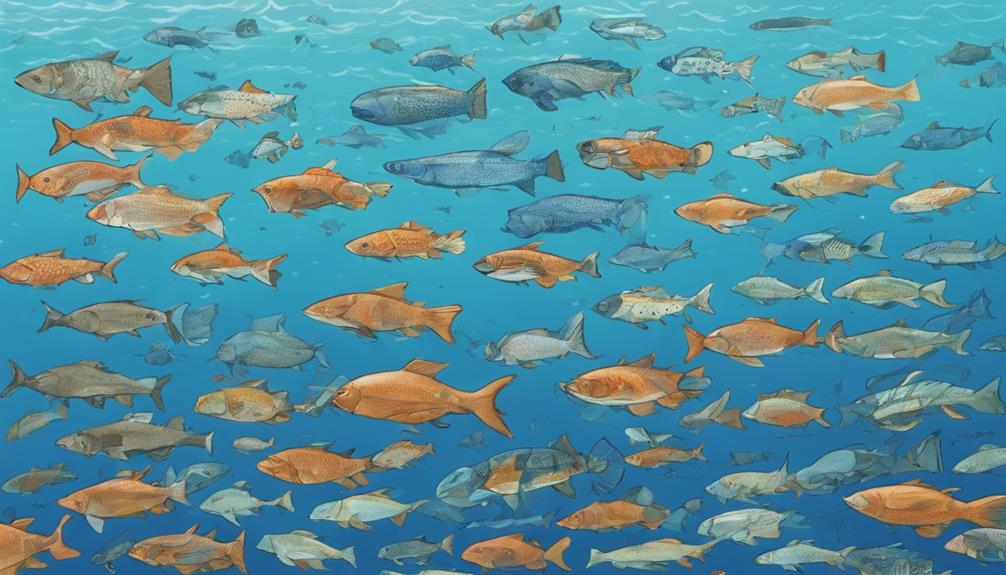
Consider implementing a system for tracking and enforcing catch limits to ensure sustainable fishing practices during your deep-sea excursions. By setting up a robust monitoring mechanism, you can contribute to the conservation of marine resources. Utilizing data analysis techniques can help you understand trends in catch sizes and species compositions, allowing for informed decision-making regarding fishing quotas.
Technology integration plays a crucial role in modern monitoring systems. By employing tools such as GPS trackers and electronic monitoring devices, you can accurately record catch data in real-time. These technologies not only streamline the data collection process but also enable authorities to monitor compliance with catch limits effectively.
Analyzing the data collected through these systems provides valuable insights into the health of fish populations and the overall impact of fishing activities. This information can guide policymakers in adjusting catch limits to prevent overfishing and protect vulnerable species. Regular data analysis ensures that fishing practices remain within sustainable limits, safeguarding the delicate balance of marine ecosystems.
Engaging in Eco-friendly Tourism
As you embark on your deep-sea fishing adventures, make a positive impact by engaging in eco-friendly tourism practices that prioritize the preservation of marine ecosystems. Here are three simple ways you can contribute to the sustainability of our oceans:
- Choose Green Accommodations: Opt for eco-friendly lodging options during your fishing trip. Look for accommodations that prioritize sustainability practices such as energy and water conservation, waste reduction, and support for local conservation initiatives. By staying in green accommodations, you can minimize your environmental impact and support businesses that are committed to preserving the marine environment.
- Get Involved with the Community: Engage with local communities in the areas where you fish. Participate in community-based conservation projects, support local businesses, and learn about the cultural and environmental significance of the region. By connecting with the community, you can gain a deeper appreciation for the marine ecosystems you're visiting and contribute to the well-being of the local residents.
- Reduce Your Carbon Footprint and Support Wildlife Preservation: Offset the carbon footprint of your travel by choosing sustainable transportation options and participating in carbon offset programs. Additionally, respect wildlife by observing animals from a safe distance, following regulations to protect marine species, and avoiding activities that may harm the environment. By reducing your carbon footprint and supporting wildlife preservation efforts, you can help conserve the natural beauty and biodiversity of our oceans.
Frequently Asked Questions
Can Deep Sea Fishing Have a Positive Impact on the Environment?
Deep sea fishing can have a positive impact on the environment if done sustainably. By following regulations and practicing responsible fishing methods, you can help promote marine conservation and support ecosystem health.
Choosing selective fishing gear, avoiding overfishing, and protecting vulnerable species are key steps in ensuring that deep sea fishing benefits the environment rather than harms it. Your actions can make a difference in preserving the delicate balance of marine ecosystems.
How Do Deep Sea Fishing Practices Affect Non-Target Species in the Ecosystem?
When you're out deep sea fishing, it's important to consider how your practices can impact non-target species in the ecosystem.
Bycatch management and conservation efforts play a crucial role in maintaining ecosystem balance and preserving marine biodiversity.
Being mindful of the species you're catching and implementing sustainable fishing practices can help reduce the negative effects on non-target species and contribute to the overall health of the marine environment.
What Role Do International Regulations Play in Mitigating the Environmental Impact of Deep Sea Fishing?
International cooperation is crucial in mitigating the environmental impact of deep sea fishing. Through coordinated efforts and regulations, countries can work together to enforce sustainable fishing practices and conservation efforts.
By setting standards for fishing methods and quotas, international regulations help protect marine ecosystems and prevent overexploitation of fish stocks.
This collaboration plays a significant role in ensuring the long-term health and sustainability of our oceans.
Are There Any Alternative Methods to Deep Sea Fishing That Are More Environmentally Friendly?
To reduce environmental impact in deep sea fishing, consider eco-friendly techniques and sustainable practices. Alternative methods like pole-and-line fishing or using traps instead of nets can help protect marine life.
By choosing selective gear and avoiding overfishing, you can contribute to a healthier ocean ecosystem.
Keep exploring innovative ways to fish responsibly and protect the environment for future generations.
How Can Consumers Support Sustainable Deep Sea Fishing Practices?
To support sustainable deep sea fishing practices, start by increasing consumer awareness. Learn about where your seafood comes from and how it's caught. Make sustainable seafood choices by opting for certified products. Look for labels like MSC or ASC.
These choices encourage responsible fishing methods and help protect marine ecosystems. Your decisions as a consumer can make a positive impact on the future of our oceans.
Conclusion
By following these tips on mitigating deep sea fishing environmental impact, you can help protect the delicate balance of the ocean ecosystem.
Sustainable practices, responsible waste disposal, and supporting marine conservation efforts are all crucial steps in ensuring the health of our oceans for future generations.
Remember, every small action counts towards making a big difference in preserving our marine environments.
Take responsibility and fish smart to help protect our oceans.
